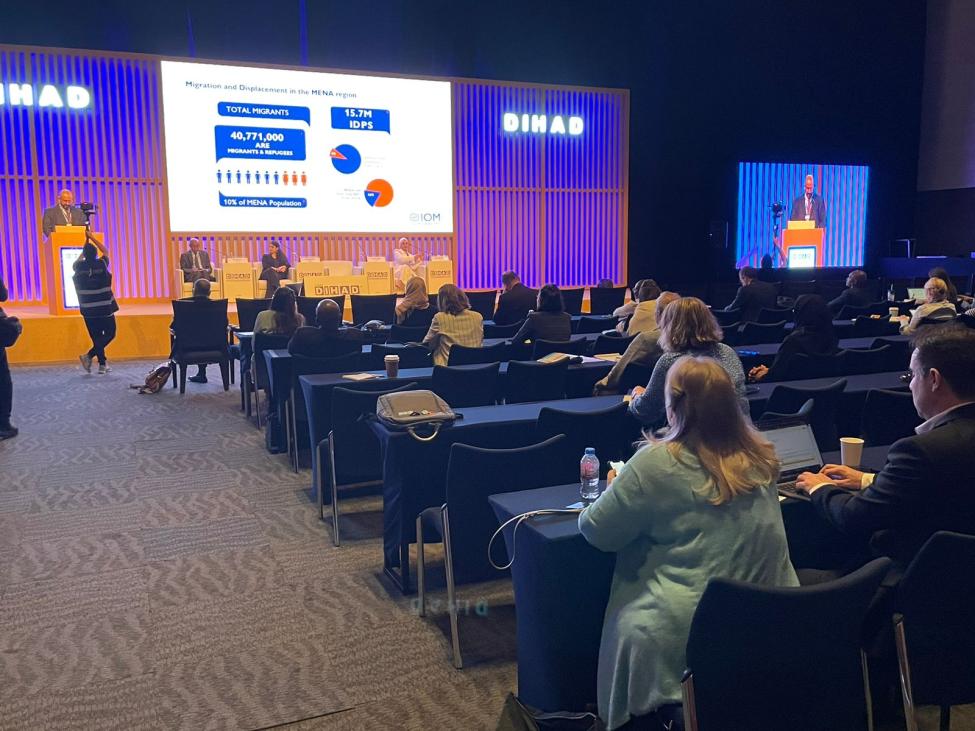-
Who we are
WHO WE AREIOM is the leading inter-governmental organization promoting humane and orderly migration for the benefit of all, with presence in over 100 countries. IOM has been active in the Middle East and North Africa from the early 1980s.
About
About
IOM Global
IOM Global
-
Our Work
Our WorkAs the leading inter-governmental organization promoting since 1951 humane and orderly migration, IOM plays a key role to support the achievement of the 2030 Agenda through different areas of intervention that connect both humanitarian assistance and sustainable development. Across the Middle East and North Africa region, IOM supports States in realizing their national priorities and in fulfilling their international commitments in the areas of migration, displacement and mobility.
Cross-cutting (Global)
Cross-cutting (Global)
- Where we work
- Take Action
- Data and Resources
- 2030 Agenda
IOM MENA Regional Director Speaks at DIHAD Conference on Harnessing Resources for People on the Move
(Dubai – 15 March 2023). The International Organization for Migration (IOM)’s Regional Director for the Middle East and North Africa, Mr. Othman Belbeisi, has today participated in a panel discussion titled “Harnessing Resources to Assist the Growing Numbers of People on the Move” at Dubai International Humanitarian Aid and Development (DIHAD).
The DIHAD conference is an annual event hosted by the United Arab Emirates (UAE) that serves international humanitarian aid and development communities in the Middle East, Africa and the world. It provides a platform where humanitarian and development actors can interface with relevant actors from the corporate and governmental sectors with a view to creating meaningful synergies in support of those in need.
During his intervention, the IOM Regional Director highlighted key issues related to resources, including energy needed for displaced people in refugees or IDPs camps or for those on the move.
“Climate change, environmental degradation, conflicts and disasters are not only generating a massive and persistent energy crush but are also impacting on human life around the world and affecting contemporary migration dynamics.” said Mr. Othman Belbeisi, IOM MENA Regional Director.
“IOM works through Skills Mobility Partnerships to empower migrants and mobile populations as development actors and leverage their contributions for innovation on water-use efficient solutions and water resources management. Also enables Member States to implement transformative adaptation to climate change and disaster risk reduction measures linked to integrated water resource management.”
Climate change, conflicts and natural or man-made disasters are all coming together to produce a massive and persistent energy crunch. In 2021 alone, there were 23.7 million new displacements related to disasters, 22.3 million of which were due to weather-related phenomena such as storms, floods and droughts. These impacts are expected to increase. Recent estimates for six world regions suggest that, unless action is taken, up to 216 million people could move internally within their countries by 2050, according to the World Bank.
“For many, deciding to move can be a positive adaptation strategy. With many households already using migration as a strategy to increase preparedness for future hazards and the 2030 Agenda already recognizes the positive contribution of migrants for inclusive growth and sustainable development.” Mr Belbesis added.
The DIHAD Conference addresses several topics including “The impact of rapidly changing sources and costs of energy on humanitarian aid and development”; “Supply chains and food security”, “Harnessing resources in pursuit of global health and wellbeing for inclusive, equitable quality education, and to assist the growing numbers of people on the move”; and “Caring for the planet; the role of new technologies”.
IOM is organizing a booth alongside other UN agencies for the duration of DIHAD conference to showcase and promote the humanitarian work related to migrants and migration.
For more information, please contact: mmabunajela@iom.int
